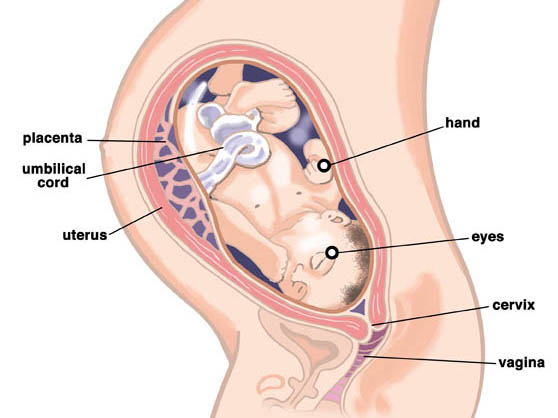38 Weeks Pregnant
Related Articles
External Links
- This article has no external links.
Your baby at 38 weeks
Still growing steadily, you can expect the baby to weigh around 3.1kg this week, and they will probably be around 51cm in length from crown to heel. Did you know that newborn boys tend to be slightly heavier than newborn girls? The baby is now fully equipped to survive outside the womb should they choose to leave ahead of schedule. However, they still need to finish shedding the vernix that is protecting their skin and the lanugo, the fine hair that has been helping to keep them warm during pregnancy. So, if they do decide to make an early appearance, you can expect to meet a rather waxy and furry looking little baby, but these won't be permanent features!

How you are feeling
At 38 weeks, you may find that you start to carry differently. The baby (or your bump) may feel lower, and in some women this can be quite visible. This is normal, and is just the baby's head dropping into your pelvis to prepare for delivery. You might find that you are more comfortable now as you can breathe more easily, but at the same time you may notice that walking feels a little uncomfortable and that you need to walk with a wider gait (the so called 'pregnancy waddle'). After all you have experienced so far in pregnancy, you are probably beyond caring what you look like now, and so you should be.
Even though the baby is in a lower position, it is still absolutely fine (unless you are told otherwise by your midwife or GP) to continue having sex with your partner. You may find that in these last few weeks of pregnancy you experience a little spotting or blood-stained mucus after intercourse. This can occur up to 48 hours afterwards. This is normal and is probably just a result of the cervix being a little bruised. If spotting becomes bleeding, then you should contact your GP. If spotting is accompanied by contractions then it is possible that you are going into labour.
What you need to do
You will have another routine antenatal appointment this week, and your midwife will give you a plan of action should your pregnancy exceed 41 weeks. They will also make the same tests as they have previously: checking the size of your abdomen, measuring your blood pressure, and testing for protein in your urine.
If you haven't already, then it is probably wise to get your hospital bag packed and ready now. You may still have another 4 weeks to wait, but if you find yourself in labour tonight, the last thing you want to have to think about is looking for those baby grows you bought and washed months ago, or trying to get your partner to locate a 24 hour chemist in order to purchase some breast pads or maternity towels. You may have received some advice on what to pack at your antenatal class, or from friends. Try to be sensible when writing the list of what you will need. There is no need for you to trundle in with suitcases full to the brim with snacks to last you a fortnight, 3 novels, 40 nappies and a collection of stuffed bears for the baby. Firstly, if all goes smoothly you could be home in less than 24 hours, secondly, if you do have to stay in hospital a few days then you can always ask your partner to bring in anything extra that you need while you are there. On the other hand, it is not advisable to arrive to hospital empty-handed; yes the hospital will have a stock of nappies and baby grows for emergencies but you should have your own items packed and ready to use. Essential items include a watch for timing contractions, your wash bag so that you can perk yourself up with a shower, slippers, changes of underwear, a loose nightshirt with a button front if you intend to breastfeed, snacks for yourself, sanitary towels, breastpads, a car seat and going home outfits for both you and the baby.
| << 37 Weeks Pregnant | 39 Weeks Pregnant >> |